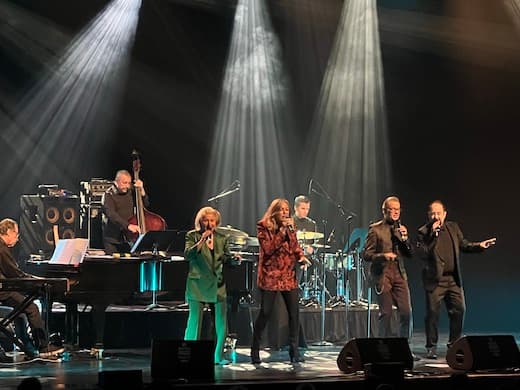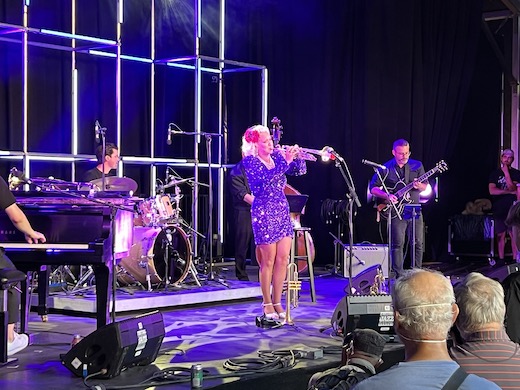Why Even Manhattan Is Not Enough for Those Wanting the Very Best in Jazz
The Montreal Jazz Fest is like nothing I’ve ever experienced, even in Newport or New Orleans. For roughly two weeks at the end of every June and the start of July, music is omnipresent here.

MONTREAL — In 1928, at the height of Prohibition, Harry Warren, soon to be the songwriter emeritus of the Hollywood movie musical, composed a highly topical tune called “Hello, Montreal.” The lyrics give a good idea of what it’s all about: “With a stein upon the table, I’ll be laughing at you all, / Goodbye Broadway, hello Montreal.”
In other words, with the 18th Amendment being the law of the land in the U.S., party-loving Americans gleefully hopped the locomotive to north of the border, where one could still enjoy an adult beverage without worrying if any G-men were hiding behind the potted palms.
Nearly 100 years later, Americans are still coming up to Canada for something we can’t get at home: the Montreal Jazz Fest. I realize that this is an odd statement from a Manhattan-based jazz fan: There are more great artists and bands playing New York City nightly than anyone can possibly take in.
Yet the Montreal Jazz Fest is like nothing I’ve ever experienced, even in Newport or New Orleans. For roughly two weeks at the end of every June and the start of July, music is omnipresent here: It seems to be the force that drives the traffic, powers the lights, and fuels the cars, trains, and buses bringing everyone to the center of town, where bands from the U.S., Canada, and all over the world perform in a dozen or so venues simultaneously. The very air is jazz-tinted.
In the glory years, the 2000s and 2010s, the Montreal Jazz Fest encompassed some 500 performances, as I noted in a 2003 column in The New York Sun, 350 of which were outdoors and/or free of charge. The fest officially celebrated its 40th anniversary in 2019, but the pandemic put the kibosh on most of the 2020 and 2021 events. This year, it is almost back to full strength — and now again in its customary summer slot, but with fewer daylight performances than in the old days.
In three nights at the fest, I caught three big concerts by headliners, starting with Pink Martini, covered on these pages earlier this week, and concluding with the Manhattan Transfer, see below. In between there was a stunning set led by Terri Lynn Carrington, part of the fest’s long-standing series of “invitationals,” in which a headliner teams with different soloists and ensembles over the course of multiple nights.
The veteran drummer concluded the three-night series with an ensemble of younger, mostly female musicians, billed as “Art of Living,” featuring pianist Kris Davis. The program was essentially a series of open-ended, modal bop compositions; the high point was the encore, played by Ms. Carrington and Ms. Davis. It had to be the sunshiniest duet for piano and drums that I’ve ever heard.
I was also able to catch Takuya Kuroda, an exuberant Japanese trumpeter who works with an electrified rhythm section and seems to split the difference between late-era Miles Davis (without the anguished tone) and Chris Botti, with something of the latter’s pop sheen. There was also a typically exciting outdoor set by Sweden’s Gunhild Carling, an even more extravagant brass player and entertainer who switches between trombone and trumpet — at one point even playing three of the latter at once — and who continually engages her audiences with a combination of musicianship and showmanship.

I hope to have the opportunity to write more about all of these artists in the future, as well as the Manhattan Transfer, who are about to celebrate their 50th anniversary. There’s a lot to be said about this exceptional quartet and all the many musical roads they’ve traveled over the last half century, but I’ll restrict myself to two major points for the present.
First, not having seen them live in much too long, I was reminded of how overwhelming the Transfer is in concert; they grab the stage and hold it like few other acts, with one home run of a number after another as well as thoughtful staging. Second, it’s easy to forget how many Transfer classics there are after all these years; they did a solid 80-minute set — no opening act or warmup — and everyone in the house would have gladly returned for a second half of equal length.
For all the Transfer signatures that they did include, like the big band-inspired “Tuxedo Junction” and “Java Jive” and the elegantly doo-woppy “Trickle, Trickle,” there were at least as many among the missing, like “Four Brothers” and “Gal in Calico.”
The absence of “Twilight Zone” was a surprise, but the climactic “Birdland” — as memorable a jazz-pop anthem as the last five decades has produced — was an expected and welcome climax. Even more impressive was “Cantaloop,” an intricate, multi-leveled mashup of Herbie Hancock, the British “jazz-rap” group Us3, and other sources. Introduced on their most recent album, 2018’s “The Junction,” this is a new Transfer classic along with “Tequila,” the iconic 1958 pop instrumental reinvented as a vocal group feature.
There are other perks to attending the Montreal Jazz Fest, not least among them a fast food emporium in the middle of the central plaza that serves Dairy Queen desserts (much appreciated by Canadian connoisseurs) as well as the Quebecois specialty known as poutine, both of which can be described as junk food of the gods. Hard as it may be for us metro-provincial New Yorkers to believe, there are some things you just can’t get in Manhattan.
Correction: Celebration of the 40th anniversary of the festival took place in 2019, but the pandemic put the kibosh on most of the 2020 and 2021 events. An earlier version of this article misstated what happened with the festival in those years.

